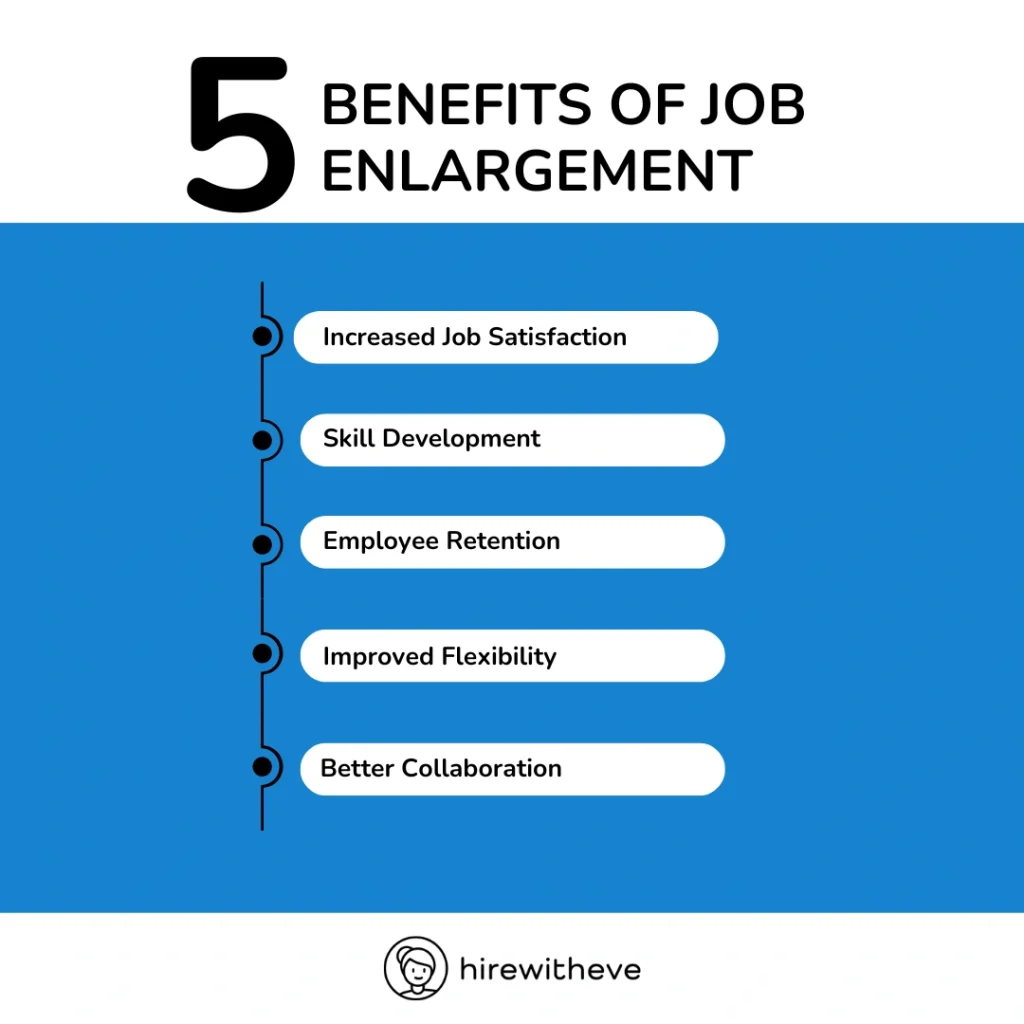What Is Job Enlargement? All You Need to Know

In today’s fast-paced work environment, employers and HR managers are constantly looking for ways to improve employee satisfaction, productivity, and engagement. One method that has gained traction in recent years is Job Enlargement. This strategy involves expanding the number of tasks an employee performs, providing them with a wider variety of responsibilities within their role.
In this blog, we will dive deep into the concept of Job Enlargement, its benefits, challenges, and how it differs from other methods like job enrichment. We will also explore how companies can leverage this approach to enhance the workplace experience for their employees.
What is Job Enlargement?
Job Enlargement is a horizontal expansion of a job, meaning that employees are given more tasks that are at the same level of complexity and responsibility. This is different from job enrichment, which focuses on increasing the depth of a job by adding more responsibilities that require higher levels of skill and decision-making.
The core idea behind Job Enlargement is to increase the scope of an employee’s role by adding variety to their daily tasks. For instance, a data entry clerk might also be assigned tasks related to customer support or record management, broadening the range of their responsibilities. The goal of Job Enlargement is to reduce monotony, increase engagement, and make the employee’s workday more interesting.
For HR managers and talent acquisition specialists, understanding the nuances of Job Enlargement can help design roles that enhance job satisfaction and improve retention.
What are the Benefits of Job Enlargement?
Implementing Job Enlargement offers several benefits, both for the employee and the organization.
Let’s look at some of the key advantages:

Increased Job Satisfaction
When employees are exposed to a wider range of tasks, they tend to feel more satisfied with their jobs. This is because they are no longer restricted to performing the same repetitive duties every day, which can lead to boredom and frustration. By adopting Job Enlargement, employees are more likely to stay engaged and motivated.
Skill Development
Expanding an employee’s role through Job Enlargement allows them to learn new skills. For example, someone working in data entry who is given customer support tasks will acquire communication skills, problem-solving abilities, and multitasking experience.
Employee Retention
One of the key concerns for HR managers is employee retention. Job Enlargement can help retain employees by offering them a variety of tasks, which in turn keeps their work stimulating and prevents burnout. Employees are less likely to leave a job that provides them with opportunities for growth and learning.
Improved Flexibility
With Job Enlargement, employees become more versatile. This means they can switch between tasks more easily and fill in for other team members when necessary, creating a more flexible and agile workforce.
Better Collaboration
As employees are given more diverse responsibilities, they tend to work with different departments or teams. This leads to improved collaboration and knowledge sharing across the organization.
What are the Challenges of Job Enlargement?
While Job Enlargement has many benefits, it is not without its challenges. HR managers need to be aware of these potential pitfalls to ensure the successful implementation of the strategy.
Risk of Overload
One of the primary risks of Job Enlargement is overloading employees with too many tasks. If not managed properly, this can lead to stress, decreased productivity, and ultimately, burnout.
Lack of Depth
While Job Enlargement focuses on broadening the scope of a job, it does not necessarily deepen the responsibilities. This can be a drawback for employees who are looking for more meaningful or challenging work. In such cases, job enrichment might be a better alternative.
Resistance to Change
Employees who are accustomed to their current roles may resist Job Enlargement because it requires them to adapt to new tasks. Overcoming this resistance involves clear communication and providing adequate support to ensure a smooth transition.
Training Requirements
To implement Job Enlargement effectively, employees need to be trained in their new responsibilities. This can require time and resources, making the initial transition period more demanding for HR departments.
How Job Enlargement Differs from Job Enrichment?
Although the terms are sometimes used interchangeably, Job Enlargement and job enrichment are distinct concepts. As previously mentioned, Job Enlargement involves adding more tasks to an employee’s role at the same level of responsibility, whereas job enrichment focuses on increasing the depth of the role by adding more complex and decision-making tasks.
For example, in Job Enlargement, a marketing assistant may be given additional tasks such as managing social media accounts or organizing events. In job enrichment, the same assistant might be tasked with developing marketing strategies or managing a project. While both methods aim to improve job satisfaction, Job Enlargement focuses on variety, and job enrichment focuses on depth.
Survey on Job Enlargement
A survey conducted by the Society for Human Resource Management (SHRM) revealed that organizations that implement Job Enlargement tend to see a higher level of employee engagement and satisfaction. According to the survey, 68% of HR managers reported a positive impact on employee morale when they introduced Job Enlargement in their teams. The same study found that organizations with Job Enlargement programs also experienced lower turnover rates and higher employee retention.
However, the survey also noted that proper implementation is crucial for success. HR managers need to ensure that employees are not overwhelmed by their expanded roles and that adequate training and support are provided. The survey further highlighted the importance of monitoring employee feedback to adjust tasks as needed.
Conclusion
In conclusion, Job Enlargement is an effective strategy for enhancing job satisfaction, skill development, and overall employee engagement. By expanding the variety of tasks within a role, organizations can reduce monotony, improve flexibility, and promote collaboration across teams. However, it is important to recognize the challenges of implementing Job Enlargement, such as potential task overload and resistance to change.
For HR managers and talent acquisition specialists, understanding the full scope of Job Enlargement is essential to creating a balanced and engaging work environment. With the right planning and execution, Job Enlargement can be a powerful tool to boost employee motivation and improve retention in the workplace.
By leveraging strategies like Job Enlargement, HR teams can keep their workforce energized, skilled, and loyal — key elements for long-term organizational success.
